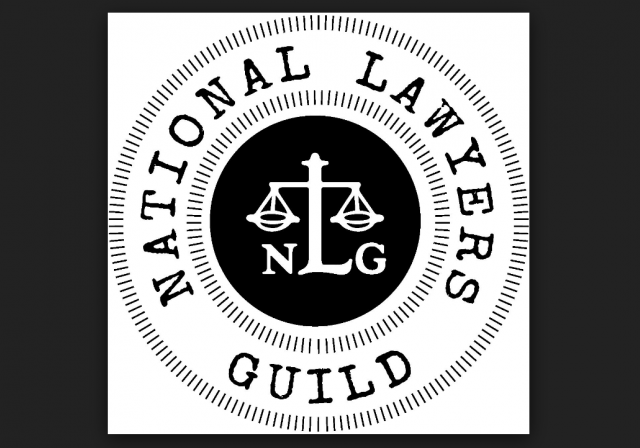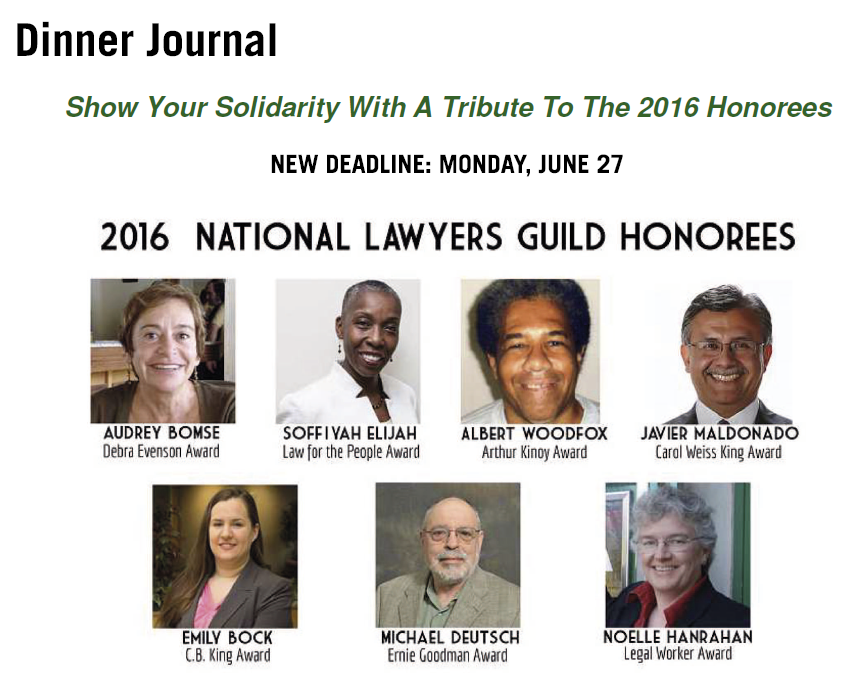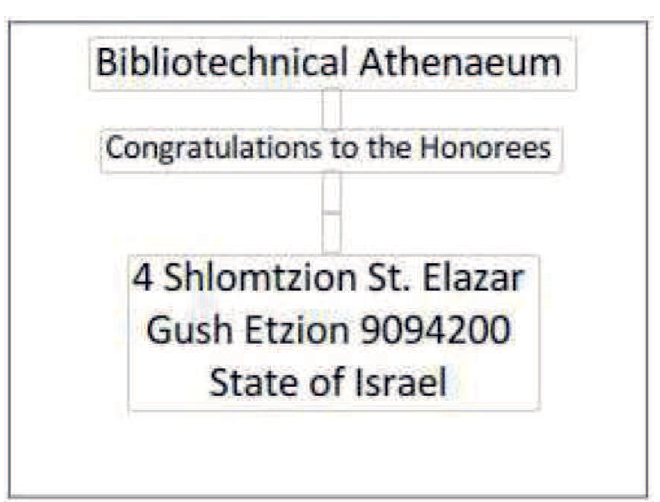Court: Discrimination case by Israeli company against National Lawyers Guild can advance
Bibliotechnical Athenaeum claims national origin discrimination after advertisement in dinner gala brochure allegedly rejected because it is Israeli

The National Lawyers Guild is a left-wing lawyer organization that, among other things, actively provides legal advocacy in support of the Boycott, Divestment and Sanctions movement. NLG also advocates against Israel on a variety of international issues.
NLG is a “proud member” of the U.S. Campaign to End the Israeli Occupation (since rebranded as U.S. Campaign for Palestinian Rights), the group that is so toxically anti-Israel that not a single congressman or congresswoman would sponsor its intended Capitol Hill event.
NLG also has filed legal briefs and provide other legal support in support of convicted terrorist Rasmea Odeh, who recently agreed to plead guilty to immigration fraud.
In July 2016, the National Lawyers Guild, Inc. and the National Lawyers Guild Foundation, Inc. (collectively, “NLG”) were sued by Bibliotechnical Athenaeum, an Israeli company.
The lawsuit alleges that NLG refused to accept an advertisement from Bibliotechnical to be placed in an NLG Dinner Journal for an event. Bibliotechnical alleged that the ad was rejected because Bibliotechnical is an Israeli company.
The Complaint (full copy here) alleged, among other things:
1. This is an action for unlawful discrimination under the New York City and State Human Rights Laws. As set forth in more detail below, the Defendants, a place or provider of public accommodation, has unlawfully denied such public accommodation to the Plaintiff on the grounds of its Israeli citizenship and origin.
2. More specifically, the Defendants refused to permit Plaintiff to participate in its Annual Banquet to be held in New York in August of 2016 by refusing to sell Plaintiff advertising space in its Dinner Journal to be distributed at such banquet. This refusal was based solely on Plaintiff’s Israeli citizenship and origin.
3. It should be emphasized that this action does not challenge the Defendants’ right to criticize Israel; to hold anti-Israel or anti-Semitic views; or to advocate for policies based on such views.
4. Instead, this action challenges the Defendants’ unlawful public accommodation discrimination regardless of the political position which underlies such discrimination.
The image below is from the court filings (full advertising brochure here):

Here is the add Bibliotechnical wanted to run in the Dinner Journal:

Bibliotechnical alleged this refusal constituted discrimination on the basis of national origin in public accommodations under New York City Human Rights Law Section 8-102 and The New York Executive Law Section 292(1). This is a similar theory used to force the American Studies Association in 2014 to permit Israelis to attend its annual meeting in California, after ASA had announced an exclusionary policy to be applied at a hotel conference, Academic boycott busted — American Studies Assoc backs off anti-Israel conference rules
At least as stated in the complaint, it does not appear that the lawsuit was brought under New York Human Rights Law, §296(13), which prohibits boycotts based on national origin (see discussion here in a prior post).
NLG moved to dismiss the complaint, to strike certain paragraphs, and to disqualify plaintiff’s counsel, David Abrams, because he was a necessary witness in the case. Among other things, NLG argued it would violate its First Amendment rights to force it to run Bibliotechnical’s advertisement, and that the Dinner event was not a public accomodation subject to the anti-discrimination laws cited in the Complaint.
The NLG Memorandum in Support of the Motion to Dismiss, the Bibliotechnical Opposition Memorandum and Affidavit, and the NLG Reply Memorandum, are at the respective links.
On the First Amendment issue, Bibliotechnical argued, among other things:
NLG’s prime argument is that it has a Constitutional right to discriminate against Bibliotechnical even if such discrimination is otherwise prohibited by the Human Rights Laws. As set forth in more detail below, the Court of Appeals already rejected this type of Constitutional challenge to the Human Rights Laws some 30 years ago in a case affirmed by the United States Supreme Court. Moreover, NLG’s argument disregards the critical distinction between (1) rejecting an advertisement based on the contents of the advertisement; and (2) rejecting an advertisement based on the race, religion, national origin, etc. of the advertiser. Thus, there is a difference between, for example, rejecting an advertisement because it supports Donald Trump for president and rejecting an advertisement because the advertiser belongs to a particular race, religion, or national origin. The former practice may very well be Constitutionally protected but is not prohibited by the Human Rights Laws. The latter practice is of course prohibited by the Human Rights Laws but is not Constitutionally protected….
NLG’s confusion is especially ironic here: The primary reason the NLG was founded in 1937 was due to the American Bar Association’s discriminatory membership practices at the time, including discrimination against Jews. No doubt the ABA felt that it was morally justified in these practices just as the NLG feels morally justified in engaging in discrimination 80 years later.
On March 30, 2017, the NY State Supreme Court in Manhattan denied in substantial part the motion to dismiss. [Note: In NY State, the “Supreme Court” is the trial court, the highest court is the Court of Appeals. So this was a trial court decision.]
The Decision and Order is embedded in full at the bottom of this post.
The Court rejected the First Amendment claim, finding that allegedly refusing to publish an advertisement for discriminatory reasons was not protected:
With respect to the Defendant’s First Amendment challenge, the United States Constitution provides that “Congress shall make no laws … abridging the freedom of speech, or of the press …. ”
In some instances “compulsion to speak may be as violative of the First Amendment as prohibitions on speech” …. Defendant argues that organizational publications such as printed programs fall within the ambit of the First Amendment. In Tornillo, the Supreme Court struck down Florida’s “right of reply” statute which required that if a newspaper assailed a political candidate’s character or record, the candidate could demand that the newspaper print a reply of equal prominence and space….
This case is also distinguishable from Tornillo because it involves alleged discrimination, which is not protected by the First Amendment…. In this same vein, the New York Court of Appeals has long recognized that free speech restrictions are consistent with the First Amendment where they serve to protect against discrimination….
As this is a motion to dismiss the court must assume Plaintiffs allegations are true…. According to the Complaint, the Defendant denied Plaintiff the right to place an advertisement in the Dinner Journal not because of the content of the advertisement, but solely because Plaintiff is an Israeli corporation. Such alleged discrimination may be enough to take this case outside the scope of Tornillo for First Amendment purposes.
The Court further found that the Dinner was a “public accommodation” under the fairly expansive definition of such term. The Court thus rejected the substantive attempts to dismiss the Complaint.
The Court did grant the portions of the motion seeking to strike certain paragraphs as extraneous, and also to disqualify plaintiff’s counsel on the grounds that he would be a central witness in the case.
I reached out to NLG’s lawyer, but have received no response as of this writing.
David Abrams, counsel for Bibliotechnical, provided the following statement:
To be sure, the National Lawyers Guild does a lot of important work on such issues as workers and citizens’ rights. But when it comes to Israel, they have got things wrong and to make matters worse, they appear to have crossed the line into what is arguably outright discrimination. The case challenges the National Lawyers Guild’s anti-Israel boycott under the New York Human Rights Laws. I urge the National Lawyers Guild to focus its energies on the true human rights violators — countries which hang homosexuals; torture political opposition; and countenance modern day slavery.
Expect NLG to appeal. We’ll continue to follow the case.
————————
Bibliotechnical Athenaeum v. National Lawyers Guild – Decision and Order on Motion to Dismiss 4-4-2017 by Legal Insurrection on Scribd
Donations tax deductible
to the full extent allowed by law.








Comments
I’m naive in the legal parts of this so my question is: why does BA want to push itself on an outfit, NLG, that wants nothing to do with them? In my non-lawyer view it seems like a variation on ” bake that cake or we’ll sue!
What am I missing?
I don’t often comment on these posts but I do read them and appreciate the information.
NLG, are active proponents of BDS, and as such are enemies of Israel. BA and its advisors decided to try a defensive/offensive maneuver to inhibit an enemy of the state, an enemy of businesses of the state. In doing so Israel, and BA, are sending a clear message that anti Israel actions will not be taken passively.
Sorry, this is a terrible ruling that needs to be overturned stat.
At least as stated in the complaint, it does not appear that the lawsuit was brought under New York Human Rights Law, §296(13), which prohibits boycotts based on national origin (see discussion here in a prior post).
“The Complaint alleges that the Defendant violated the New York State Human Rights Law6
6. NY Executive Law 290 et seq”
Unlike Tornillo and its progeny, the Defendant here is not a traditional newspaper.
So f***ing what? Since when do “traditional newspapers” have stronger first amendment rights than anyone else?
This case is also distinguishable from Tornillo because it involves alleged discrimination, which is not protected by the First Amendment
Since when? No list I’ve ever seen of exceptions to the first amendment includes “discrimination”. Have you ever seen such an exception mentioned in any authoritative source? Dicta from a district court in the Virgin Islands is hardly that, and Pittsburgh Press Co rests on the repugnant doctrine that commercial speech is not protected, which isn’t relevant here.
It seems to me that NLG has a strong first amendment case here on compelled speech. The content of the rejected ad specifically mentions the plaintiff’s national origin, so the mere act of accepting it inherently constitutes a statement by the NLG that it’s OK to do business with Israeli organisations, and that such organisations can be upstanding members of the leftist community.
This seems to me exactly parallel to NY County Board of Ancient Order of Hibernians v Dinkins, in which the court held that the mere act of allowing the Irish Lesbian and Gay Organization to march in its parade under its own banner would alter the parade’s message. Here too, allowing an ad flaunting its Israeli origins to appear in its dinner journal would inherently alter the dinner’s pro-BDS message.